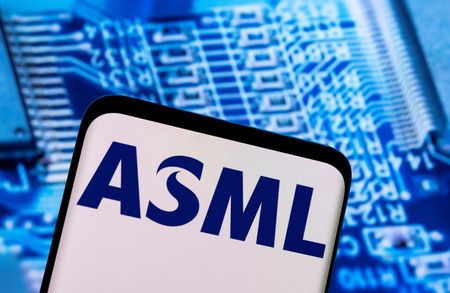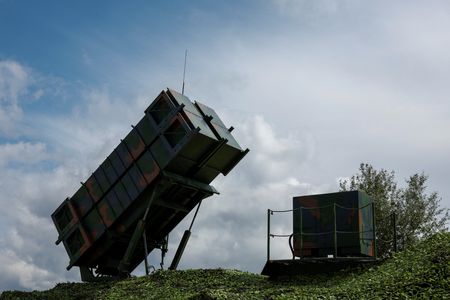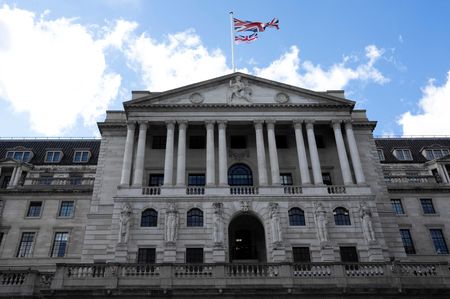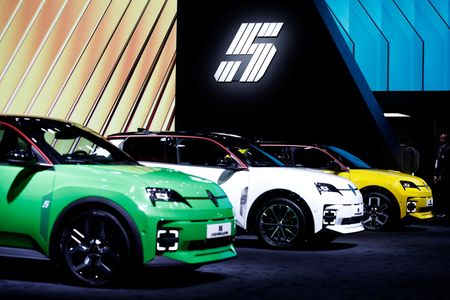By Nathan Vifflin and Ozan Ergenay
AMSTERDAM (Reuters) -ASML, the world’s biggest supplier of computer chip-making equipment, warned on Wednesday that it may not achieve revenue growth in 2026 as chipmakers building factories in the U.S. await clarity on the potential impact of tariffs.
Uncertainty in tariff talks has spurred chipmakers in the U.S. to delay finalizing investments, CFO Roger Dassen told journalists on a media call.
Shares in ASML fell as much as 10.5% and were on track for their worst day since October, dragging peers ASM, BESI, Soitec lower as well.
Investors dumped the shares even as the Dutch group’s net bookings, the most closely watched figure in the industry, came in 25% above expectations at 5.54 billion euros ($6.4 billion). Analysts consensus estimate was 4.44 billion euros, according to researcher Visible Alpha.
ASML’s EUV lithography machines made up 42% of those bookings, or 2.3 billion euros’ worth.
The machine, the world’s most advanced chip circuit printing system, is the key manufacturing technology behind leading-edge chips used in Nvidia’s GPUs, or Apple’s Macs and iPhones.
PRICES TO HEAD UP, WITH TARIFFS
A potential 30% U.S. tariff on European goods could ramp up the price of a single high-end machine to 325 million euros from 250 million euros, CFO Dassen said.
“Clarity is what customers are looking for before they can really finalize their views as to what they’re going to do,” he said, reiterating ASML’s intention to pass such costs on.
Indeed, the tariff costs may pile up for ASML as parts are sent several times from the Netherlands to the U.S.
Analysts had hoped that the quarter would provide some reassurance over ASML’s outlook for 2026, but the company warned that geopolitical uncertainty remained.
“The level of uncertainty is increasing, mostly due to macroeconomic and geopolitical consideration. And that includes, of course, tariffs,” ASML’s Chief Executive Christophe Fouquet said in an internal interview on the company’s website.
The direct and indirect impact of tariffs was uncertain, CFO Dassen said in the interview, and ASML was working with its supply chain to mitigate any impact.
“While we still prepare for growth in 2026, we cannot confirm it at this stage,” Fouquet said in a statement.
If sales growth doesn’t materialize, 2026 would be the first flat year in over a decade of uninterrupted revenue growth since 2012.
Investor Han Dieperink, CIO at firm Aureus, said he was not worried about the upcoming year, noting that the quarter pointed to solid demand.
Out of ASML’s top three customers, TSMC, Samsung and Intel, only the Taiwanese chipmaking giant was poised to order this year, analysts said.
The others are grappling with company-specific struggles, analyst Javier Correonero of Morningstar said, citing job cuts at Intel as an example.
“Intel and Samsung having yield issues (the percentage of working chips per wafer) in leading edge is bad for exposed suppliers,” analyst Michael Roeg of Degroof Petercam said, pointing to ASML, ASM, and BESI.
Nonetheless, for ASML, “the second quarter beats from top to bottom,” Roeg said, with TSMC likely to have played the biggest role in the results.
Chinese demand remained elevated, representing 27% of machine sales in the last three quarters, as its chipmakers continue to buy less advanced machines due to U.S. restrictions on buying the higher-end ones and ahead of further export curbs.
($1 = 0.8608 euros)
(Reporting by Nathan Vifflin in Amsterdam; Editing by Matt Scuffham, Kim Coghill and Bernadette Baum)










